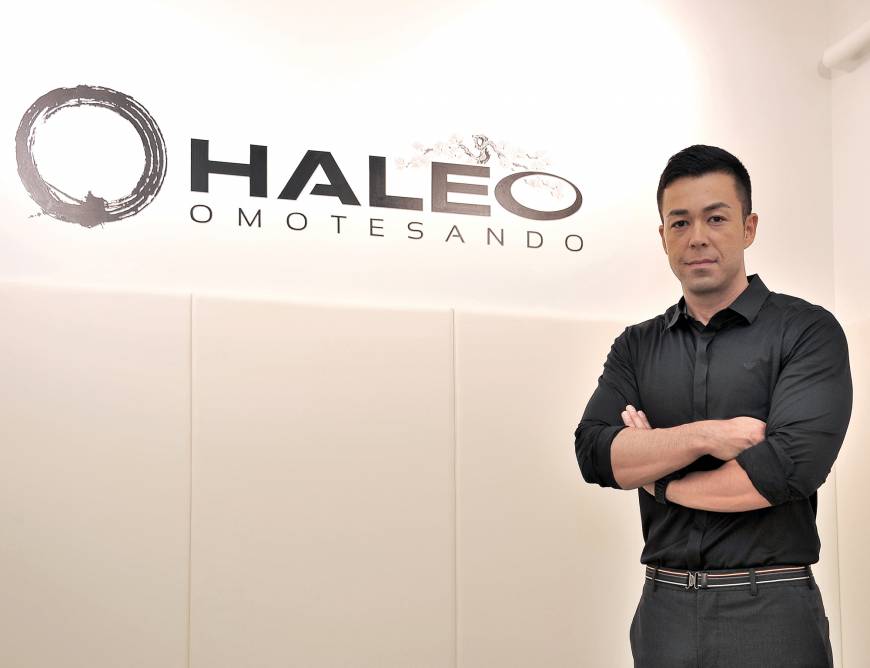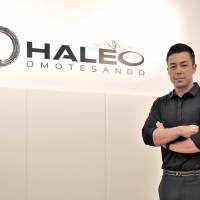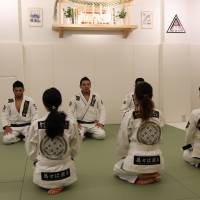To be successful in any field, one needs to be strong physically and mentally, but to be the best, a spiritual aspect is also necessary.
These three components are at the heart of Haleo Omotesando, an urban dojo newly opened in one of the best neighborhoods in Tokyo.
“It takes a lot of guts to enter a traditional dojo, which is usually in a rural area where they don’t speak English, so I wanted to lower the hurdle so that everyone can strengthen completely,” said David Halton, founder and CEO of Sendai-based BodyPlus International, which produces Haleo supplements and runs the dojo, as well as a CrossFit gym in the Daikanyama area of Shibuya Ward.
Just steps from the main boulevard, the dojo is surprisingly serene, with a terrace and bamboo garden in the rear, artisanal tatami mats in the main space and paintings and spiritual elements decorating the walls.
The dojo provides what Halton calls “full circle strength” — hence the dojo’s ink-brush circular logo — by bringing balance to the physical, mental and spiritual components. Through weight training, one becomes physically stronger while gaining mental strength by pushing beyond one’s limits; by practicing martial arts, one engages in a physical activity that requires strong mental focus; while the mokuso (meditation) and showing of gratitude inherent in life in a dojo enhances the spiritual aspects.
“The top-level athletes, I’ve noticed that physically they’re very developed, mentally they’re also very strong, but then you see the world-class athletes — champions — they also have one more component,” said Halton, a Calgary native born to a Japanese mother and Canadian father.
He describes this spiritual component with the Japanese term konjo (spirit). He cites New Zealand’s rugby team as an example.
“You have the All Blacks, who are just dominant,” Halton said. “France, South Africa and Ireland; you would say they are at the same level physically and mentally, but there’s a spiritual aspect to the New Zealand game, so it’s not just a sport anymore. I think that gives them the strength to really win. I’ve noticed that also in martial arts.”
The Haleo Omotesando dojo offers martial arts training in kickboxing and a form of Brazilian jujitsu. These activities can teach anyone such as businesspeople and global leaders valuable skills, Halton said.
Kickboxing requires striking quickly, “strengthening your reactions, being able to make decisions and listening to your gut,” Halton said, to help people “listen to instinct and always be the first to strike.”
Jujitsu is a strategic, defensive martial art. “A lot of people say it’s like chess, so you’re always thinking steps ahead of your opponent,” Halton said, helping people “look ahead and strategize.”
More than these aspects, however, Halton adds that a dojo is a place “where we as adults continue our education on humanism, being good people.”
For five or six years, Halton thought about opening a dojo, “but we never had the correct role models, the teachers that can teach that aspect of the martial art, until now, so all the teachers that we have are world champions, just really good people at heart.”
“I really got on to the spiritual aspect two or three years ago, when I started to research scientifically in the Western style,” he said. “So if I have the data, I can explain it and Westerners appreciate evidence and data.”
He found that “not just the meditation, but the training that happens in the dojo affects the hormones; the neurotransmitters that make us happy.”
“This is why Japan is still the place with the kindest people; the most peaceful and safest place on Earth,” Halton said. “We should promote this, keep it going. More people should be able to be involved in martial arts because it just makes our society better and makes people better.”
Ultimately, Halton said, the Haleo Omotesando dojo is “our way of giving back, creating good for society and for people in our own unique way.”
- Business execs discuss men’s fashion
- Luxury and functionality in perfect pairing
- Balancing the body, mind, spirit
- Download the PDF of this Men's business style special
For more information, see haleoomd.com


 Click to enlarge
Click to enlarge

